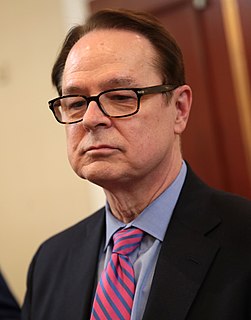A Quote by Walter E. Williams
In explaining the Constitution, James Madison, the acknowledged father of the Constitution, wrote in Federalist Paper 45: 'The powers delegated by the proposed Constitution to the Federal government are few and defined. Those which are to remain in the State governments are numerous and indefinite. The former will be exercised principally on external objects, as war, peach, negotiation, and foreign commerce.' Has the Constitution been amended to permit Congress to tax, spend and regulate as it pleases or have Americans said, 'To hell with the Constitution'?
Quote Topics
Acknowledged
Been
Commerce
Congress
Constitution
Defined
Explaining
External
Father
Federal
Federal Government
Federalist
Few
Foreign
Former
Government
Governments
Hell
Indefinite
James
Madison
Negotiation
Numerous
Objects
Paper
Peach
Permit
Pleases
Powers
Proposed
Regulate
Remain
Said
Spend
State
State Government
State Governments
Tax
Those
War
Which
Will
Wrote
Related Quotes
The powers delegated by the proposed Constitution to the federal government are few and defined. Those which are to remain in the State governments are numerous and indefinite. The former will be exercised principally on external objects, as war, peace, negotiation and foreign commerce. ... The powers reserved to the several States will extend to all the objects which in the ordinary course of affairs, concern the lives and liberties, and properties of the people, and the internal order, improvement and prosperity of the State.
Article I, Section 8, of the Constitution, of course, lays out the delegated, enumerated, and therefore limited powers of Congress. Only through a deliberate misreading of the general welfare and commerce clauses of the Constitution has the federal government been allowed to overreach its authority and extend its tendrils into every corner of civil society.
The bottom line is that we've become a nation of thieves, a value rejected by our founders. James Madison, the father of our Constitution, was horrified when Congress appropriated $15,000 to help French refugees. He said, 'I cannot undertake to lay my finger on that article of the Constitution which granted a right to Congress of expending, on objects of benevolence, the money of their constituents.' Tragically, today's Americans would run Madison out of town on a rail.
The real reason to abolish departments like Energy and Education is not to promote efficiency, nor even to save taxpayers’ money. It is that many agencies perform functions that are not Federal responsibility. The founders delegated to the Government only strictly defined authority in Article I, Section 8, of the Constitution. Search the entire Constitution, and you will find no authorization for Congress to subsidize the arts, finance and regulate education or invest tax revenues in energy research.
[The Massachusetts constitution] resembles the federal Constitution of 1787 more closely than any of the other revolutionary state constitutions. It was also drawn up by a special convention, and it provided for popular ratification - practices that were followed by the drafters of the federal Constitution of 1787 and subsequent state constitution-makers.
I think [John Adams's] influence on the federal Constitution was indirect. Many including James Madison mocked the first volume of Adams's Defence of the Constitutions of the United States in 1787. But his Massachusetts constitution was a model for those who thought about stable popular governments, with its separation of powers, its bicameral legislature, its independent judiciary, and its strong executive.
I, sir, have always conceived - I believe those who proposed the constitution conceived,and it is still more fully known, and more material to observe, those who ratified the constitution conceived, that this is not an indefinite government deriving its powers from the general terms prefixed to the specified powers - but, a limited government tied down to the specified powers, which explain and define the general terms.
It [the Constitution] didn't break free from the essential constraints that were placed by the founding fathers in the Constitution, at least as it's been interpreted, and the Warren court interpreted it in the same way that generally the Constitution is a charter of negative liberties. It says what the states can't do to you, it says what the federal government can't do to you, but it doesn't say what the federal government or the state government must do on your behalf. And that hasn't shifted.
The tenth amendment said the federal government is supposed to only have powers that were explicitly given in the Constitution. I think the federal government's gone way beyond that. The Constitution never said that you could have a Federal Reserve that would have $2.8 trillion in assets. We've gotten out of control.
Those who proposed the Constitution knew, and those who ratified the Constitution also knew that this is...a limited government tied down to specified powers....It was never supposed or suspected that the old Congress could give away the money of the states to encourage agriculture or for any other purpose they pleased.
The laws are, and ought to be, relative to the constitution, and not the constitution to the laws. A constitution is the organization of offices in a state, and determines what is to be the governing body, and what is the end of each community. But laws are not to be confounded with the principles of the constitution; they are the rules according to which the magistrates should administer the state, and proceed against offenders.































